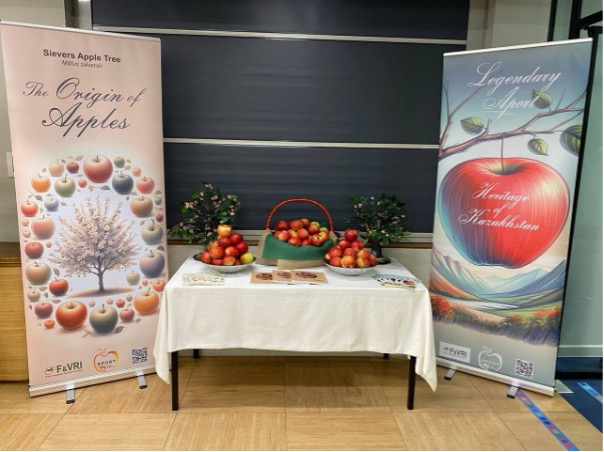- Kazakhstan

Kazakhstan: Apples
OCOP: Almatinsky Aport Apples
Year: 2023
Character and comparative advantage: Kazakhstan, which is in the region where apples originated, boasts a rich diversity of varieties of the fruit, with unique flavours and qualities not found in other parts of the world. The country’s wealth of genetic diversity includes apple varieties with distinct flavours and aromatic characteristics.
In addition, apple varieties from Kazakhstan are naturally resistant to pests and diseases, reducing the need for chemical treatments. Production in Kazakhstan minimizes environmental impacts through the rational use of fertilizers, integrated pest control and the efficient use of water resources.

The diversity of climatic zones in Kazakhstan makes it possible to extend the apple harvesting season, ensuring a constant availability of fresh and high-quality fruits, and the country’s favourable geographical location facilitates the rapid delivery of fresh fruits to consumer markets.
The genetic characterization and geographical identification of origin of Almatinsky Aport and other traditional varieties of Kazakhstan apples is crucial to supporting the unique selling points of the apples in the international markets, creating brand awareness and recognition.
Producing areas: In Kazakhstan, apples are grown in the foothills zone north of the Trans-Ili Alatau ridge in the Almaty region, at an altitude of 900–1700 metres above sea level. The production area of includes the settlements of Talgar, Enbekshikazakh, Karasai, Bostandyk, Medeu districts and the foothill areas of Almaty.
Demands: Apples are demanded in the local market as well as in the export markets of Europe, the Near East and North Africa, particularly among consumers looking for organic and exotic fruit options with origin identification. Emphasizing these unique selling points – such as the apples’ distinct taste, nutritional benefits and historical significance – can pique the interest of niche markets.
Consumption: Wide opportunities exist for both processing these apples and from consuming them fresh. The apples can be used to produce concentrated apple juice; 100 percent directly pressed apple juice that conserves useful microelements and vitamins; applesauce; apple jam; and apple pectin.
Beneficiaries: The main beneficiaries are the farming communities, mainly in terms of food security and income opportunities through both domestic and export markets.
The global apple market is highly competitive; however, consumer trends are increasingly favouring sustainability, traceability and authenticity. Positioning apples from Kazakhstan as sustainably farmed, with a transparent supply chain and rich heritage, aligns with consumer preferences and offers a competitive edge in the international market.
The nutrition and health of the Kazakh population could be improved through the wide introduction of these apples. A climate-resilient crop, apples could help reduce the climate and environment shocks induced by climate change and management practices. Thus, apples can be a good solution to improve climate resilience, food and income security, health benefits and environmental sustainability.

Contact
